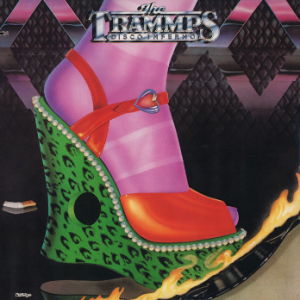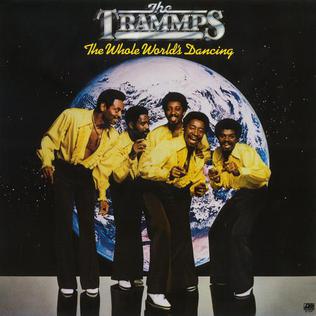Related Research Articles

Disco is a genre of dance music and a subculture that emerged in the 1970s from the United States' urban nightlife scene. Its sound is typified by four-on-the-floor beats, syncopated basslines, string sections, horns, electric piano, synthesizers, and electric rhythm guitars.

The Trammps are an American disco and soul band, who were based in Philadelphia and were one of the first disco bands.
MFSB, officially standing for "Mother Father Sister Brother", was a pool of more than 30 studio musicians based at Philadelphia’s Sigma Sound Studios. They worked closely with the production team of Gamble and Huff and producer/arranger Thom Bell, and backed up such groups as Harold Melvin & the Blue Notes, the O’Jays, the Stylistics, the Spinners, Wilson Pickett, and Billy Paul.

"Got to Give It Up" is a song by American music artist Marvin Gaye. Written by the singer and produced by Art Stewart as a response to a request from Gaye's record label that he perform disco music, it was released in March 1977.

Disco Inferno is the fourth studio album by American soul-disco group, The Trammps, released in 1976 through Atlantic Records.

Where the Happy People Go is the third studio album by American soul-disco group, The Trammps, released in 1976 through Atlantic Records.

The Whole World's Dancing is the sixth studio album by American soul-disco group, The Trammps, released in 1979 through Atlantic Records.
Dance Club Songs is a chart published weekly by Billboard Magazine in the United States. It is a national look over of club disc jockeys to determine the most popular songs being played in nightclubs across the country. It was launched as the Disco Action Top 30 chart on August 28, 1976, and became the first chart by Billboard to document the popularity of dance music. The first number-one song on the chart for the issue dated August 28, 1976, was "You Should Be Dancing" by the Bee Gees, spending five weeks atop the chart and the group's only number-one song on the chart.

Jeanie Tracy is an American singer-songwriter, actress, and record producer. She rose to fame in the late 1970s as a background singer of Sylvester, an American disco singer. Her first album, Me and You (1982), featured post-disco hits "I'm Your Jeanie" and "Sing Your Own Song". From late 1984 to early 1985, she performed on television Show Star Search where she was the winner in the Female Vocalist category for six weeks. In 1995, Tracy released her second album It's My Time.

"Get the Party Started" is a song by American singer Pink, released as the first single from her second album, Missundaztood (2001). It became an international success and reached the top ten in many countries, peaking at number one in Australia, Ireland, New Zealand, Romania, Spain, and the Walloon region of Belgium. The song was Pink's biggest-selling song at that time. "Get the Party Started" was released on October 16, 2001, to positive reviews. After the release of the single, it was confirmed that Pink would be releasing Missundaztood.
Carol Williams, born in Montclair, New Jersey, United States, is a vocalist and songwriter who achieved success with her disco songs in the 1970s. She was the first female artist signed to the disco label Salsoul Records.

"Disco Inferno" is a song by American disco band The Trammps from their 1976 fourth studio album of the same name. With two other cuts by the group it reached number-one on the US Billboard Dance Club Songs chart in early 1977, but had limited mainstream success until 1978, after being included on the soundtrack to the 1977 film Saturday Night Fever, when a re-release hit number eleven on the Billboard Hot 100 chart.
Tyrone Garfield Kersey, known as Ron "Have Mercy" Kersey, was an American keyboardist, songwriter, producer and arranger most known for writing the music to "Disco Inferno" by The Trammps.
The Players Association was a New York based studio group, put together by drummer / arranger Chris Hills and producer Danny Weiss in 1977 on Vanguard Records.
"Mighty High" is 1975 disco/R&B single by Los Angeles-based gospel group, Mighty Clouds of Joy written by David Crawford. The single proved to be very popular with disco fans as the song stayed at number one on the disco/dance chart for five weeks, and remained on the chart for a total of fourteen weeks It became their biggest hit on both the soul chart, peaking at #22, and on the Billboard Hot 100, peaking at #69.
"That's Where the Happy People Go" is a crossover single by Philadelphia-based disco group the Trammps. Released in December 1975, the single hit number one on the disco chart for two weeks in May 1976. "That's Where the Happy People Go" also reached number twelve on the soul chart and number twenty-seven on the Hot 100. Outside the US, "That's Where the Happy People Go" went to number thirty-five in the UK.

"Let's All Chant" is a song written by Michael Zager and Alvin Fields and performed by the Michael Zager Band. It was based on an idea originally suggested by former head of A&R Jerry Love after he visited clubs in New York and saw people endlessly chanting "Ooh-ah, Ooh-ah". Although Zager was first embarrassed when Love asked him to write a song using these chants, he accepted the proposal and later co-wrote "Let's All Chant" with Fields.

Mixin' It Up is the seventh studio album by American soul-disco group, The Trammps, released in 1980 through Atlantic Records.

"Disco Dancer" is a song by the American new wave band Devo, written by Mark Mothersbaugh and Gerald Casale. It was the first Devo single that was released without their most prominent drummer Alan Myers, who was replaced by former Sparks drummer David Kendrick. It was released in 1988 as the first single from their seventh studio album, Total Devo.
References
- ↑ Whitburn, Joel (2004). Hot Dance/Disco: 1974-2003. Record Research. p. 263.CS1 maint: discouraged parameter (link)